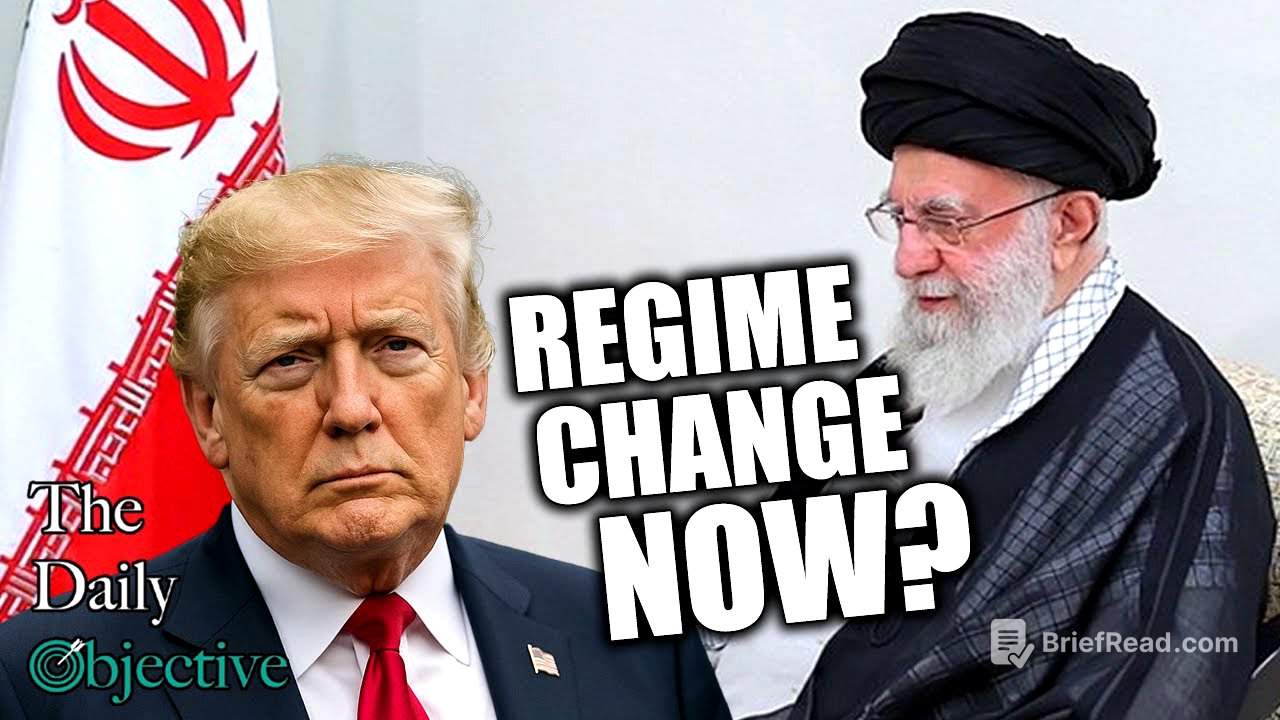TLDR;
This video discusses the potential for Donald Trump to take military action against Iran, focusing on Iran's rejection of a nuclear deal and the implications of Iran acquiring nuclear weapons. It also touches on the broader issues of dealing with dictatorships, the rise of antisemitism, and the complexities of foreign policy in the Middle East.
- Iran has rejected a nuclear deal, putting the ball in Trump's court regarding potential military action.
- Acquiring nuclear weapons would allow Iran to act with impunity, funding terrorism and attacking America without consequences.
- The speakers criticise Trump's approach to foreign policy, which they see as lacking vision and principles, driven by a desire for deals rather than actual solutions.
- The rise of antisemitism in the West is highlighted, with concerns raised about the safety of Jewish communities.
Trump's Dilemma with Iran [0:00]
The discussion begins with a reflection on Donald Trump's past diplomatic interactions, noting his tendency to publicly humiliate foreign leaders. Now, Trump faces a similar situation with Iran, who have rejected his proposed nuclear deal. Before negotiations, Trump suggested he would bomb Iran if a deal couldn't be reached. Now that Iran has refused the deal, Trump faces a choice: either ignore the red line, similar to Obama, or take decisive action, something that should have been done long ago.
The Ineffectiveness of Deals with Iran [2:51]
The speakers express scepticism about Trump's ability to handle the situation, pointing out that his red line of preventing uranium enrichment within Iran was always unacceptable to Iran. They question whether Trump is genuinely prepared to attack Iran or if this is a strategic ploy. They highlight that Iran benefits from prolonged negotiations, allowing them to progress towards acquiring nuclear weapons. The panellists argue that once Iran possesses nuclear weapons, it will be able to act with impunity, much like North Korea or Russia.
The Consequences of Iranian Nuclear Weapons [6:37]
The discussion shifts to the potential consequences of Iran acquiring nuclear weapons, including increased funding for terrorism and attacks against America. The speakers stress that even a favourable nuclear deal would only temporarily halt Iran's nuclear ambitions, while doing nothing to stop its support for terrorism or oppression of its own people. They criticise Trump, as well as previous presidents like Obama and Biden, for engaging with the Iranian regime.
The Need for Regime Change in Iran [10:16]
The speakers argue that any deal with Iran would inevitably strengthen the regime, condemning the freedom-seeking people within Iran. They suggest that merely setting back Iran's nuclear program is not a long-term solution and that the ultimate goal should be to end the regime. They believe that the Iranian regime is currently weak and that military action could potentially lead to its collapse.
Trump's Image and Foreign Policy [13:08]
The discussion touches on Trump's desire for a Nobel Peace Prize and how this might influence his decisions. The speakers suggest that Trump's foreign policy is often driven by a desire for deals rather than a clear vision or set of principles. They argue that making deals with dictatorships is not a solution and that a more decisive approach is needed to address the threat posed by Iran.
The Rise of Antisemitism and the Importance of Standing Up to Evil [18:47]
The conversation shifts to the rise of antisemitism in the West, with concerns raised about the safety of Jewish communities. The speakers highlight the double standards in how pro-Palestinian and pro-Israel activists are treated, noting that the former often advocate for genocide without facing consequences. They stress the importance of standing up to evil and not being deterred by fear.
The Need for a Clear Vision and Decisive Action [22:16]
The speakers reiterate the need for a clear vision and decisive action when dealing with Iran. They criticise Trump's desire for deals with various dictatorships, arguing that this approach will not solve the underlying problems. They emphasise that Iran has already killed Americans and is actively supporting terrorist organisations, requiring a strong response.
Lessons from History and the Path to Peace [24:50]
The speakers draw on historical examples to illustrate the importance of recognising threats and taking decisive action. They argue that appeasement, as demonstrated by Chamberlain, leads to war, while recognising and confronting threats, as Churchill did, leads to peace. They stress that when dealing with regimes that express a desire to destroy your country, dialogue is not the answer.
Trump's Opportunity and the Situation in Gaza [26:09]
The speakers conclude by highlighting Trump's unique opportunity to take decisive action on both domestic and international fronts. They express disappointment that he is not doing more to address the challenges facing the country and the world. The discussion ends with a brief mention of Greta Thunberg's planned trip to Gaza, with the speakers expressing concern about her safety and the potential for violence.








